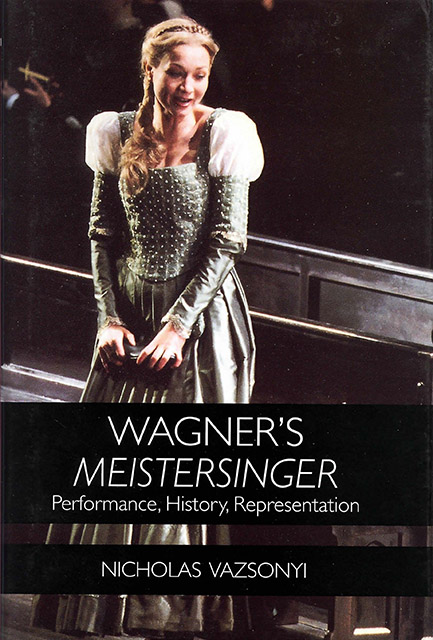5 - Stereoscopic Vision: Sight and Community in Die Meistersinger
Published online by Cambridge University Press: 25 March 2023
Summary
It has become a commonplace among Wagner scholars to consider Sachs’s interpretation of Walther's song—“It sounded so old / and yet it was so new”—as the key to both the musical style and the political program of Die Meistersinger von Nürnberg. According to scholars like Carl Dahlhaus and Theodor W. Adorno, Wagner's Die Meistersinger relies on modern compositional practices in order to conjure the impression of older musical idioms. Following Wagner's own aesthetic precisely, the music of Die Meistersinger disguises reflection and technique as nature and spontaneity. In order to become art and interlock the archaic and the modern, art here willfully effaces its own constructive efforts. “Nowhere, not even in Parsifal, is Wagner's music so artificial as in the appearance of simplicity with which it clothes itself in Die Meistersinger.” Similarly, in his hope to reconstruct feelings of national belonging via the emotive sounds of German music and the German language, Wagner in Die Meistersinger amalgamates various modern visions of sixteenth-century Nuremberg so as to recuperate a mythical past in which art knew no separation from the everyday. Interlacing romantic, conservative, and democratic narratives of the German Renaissance, Die Meistersinger conceals Wagner's historical assemblage in the spellbinding guise of unmediated presence and prophetic anticipation. Wagner's Nuremberg is a dreamt one, a chimera of the nineteenth-century imagination deeply affected by the course of German history after 1848 and prior to unification in 1870/71. While Wagner is at pains to give history the appearance of historical inevitability, his Nuremberg—in the words of Peter Uwe Hohendahl—“derives its meaning precisely from the confrontation between past and present, between medieval community and modern industrial society.”
Adorno's In Search of Wagner employs the concept of “phantasmagoria” in order to describe this puzzling fusion of old and new, and reveal the historical index of Wagner's modern recreation of the archaic. Phantasmagorias, in Adorno's understanding, indicate the
occultation of production by means of the outward appearance of the product. … In the absence of any glimpse of the underlying forces or conditions of its production, this outer appearance can lay claim to the status of being. Its perfection is at the same time the perfection of the illusion that the work of art is a reality sui generis that constitutes itself in the realm of the absolute without having to renounce its claim to image the world.
- Type
- Chapter
- Information
- Wagner's MeistersingerPerformance, History, Representation, pp. 73 - 97Publisher: Boydell & BrewerPrint publication year: 2003



